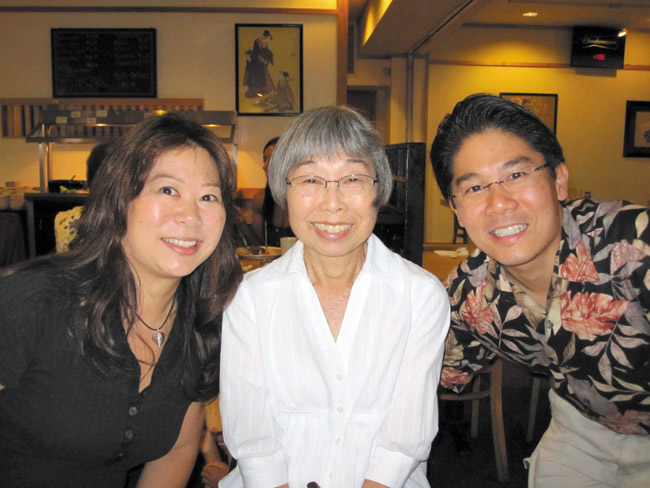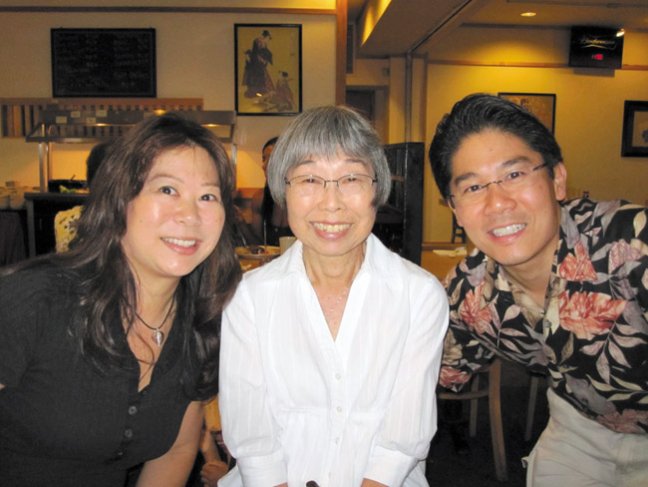Profile Of A Possibilitarian
Her mother died of stomach cancer. Her husband died of pancreatic cancer. She grieved, but she also got busy raising $50,000 for the UH Cancer Center that today funds research into early detection of pancreatic cancer
Alison Brown-Carvalho is a possibilitarian. That’s someone who, no matter how dark things seem, raises her sights and sees possibilities.
IMG_0238
Brown-Carvalho uses that power of positive thinking to blunt life’s challenges. Her personal crusade to help find a cure for pancreatic cancer, for instance, is an enviable example of community philanthropy. It demonstrates how an individual can make a difference in bottom-up benevolence.
Sometimes that journey starts tragically.
In 2005, her then-husband William Brown Jr. was diagnosed with pancreatic cancer.
“It was the day after Thanksgiving,” she recalls. “One never forgets that date.”
Four years later, Brown, 49, died after 16 years of marriage. In 2013, she lost her mother, Janet (Ikeda) Shitabata, 77, to stomach cancer.
Coping with cancer is life altering for both patient and family members.
The shock and grief are accompanied by denial, anger, depression and, in time, acceptance.
“My husband retired from a 20-year military (Navy) career, worked at Weyerhaeuser for nine years and never missed a day of work,” she says. “He was fit and active, a non-smoker and a great dad to our two children.
“Even after surgery and subsequent treatments, he persevered. He drove himself once a week to chemo, drove back to his job and worked a full day.”
But as she discovered, pancreatic cancer works in unpredictable and mysterious ways.
Pancreatic cancer develops when a cell in the pancreas located in the abdomen acquires damage to its DNA that causes it to behave and multiply abnormally, according to UHCC. Damage to the DNA can be inherited or acquired as one ages.
More than 46,000 Americans will be diagnosed with pancreatic cancer this year, and more than 39,000 will die of the disease, according to the U.S. National Cancer Institute. The cancer that develops in the gland that aids digestion is expected to become the second-leading cause of cancer death in the U.S. by 2030.
In Hawaii it is the fifth-leading cause of cancer deaths.
The reality of that statistic and her own will to “want to do something” led to an altruistic fate for Brown-Carvalho, who has since married auto businessman Dansen Carvalho and is the mother of four children.
As a result, she made a career change and joined University of Hawaii Foundation at UH Cancer Center, determined to do her part to eradicate cancer. She raised $50,000 from family members and donated it for pancreatic cancer research.
The donation is paying for a study aimed at detecting pancreatic cancer at earlier stages in order to give people a greater chance of surviving the highly lethal cancer.
“I never thought we could fund an entire research project,” she says. “I was always under the impression that hundreds of thousands of dollars were needed for even the smallest project. It’s rewarding to know our family donation might impact the detection of pancreatic cancer.”
As part of the donation, a concrete marker with her husband’s and mother’s names was recently installed on the grounds of the Cancer Center in Kakaako. The inscription states, “Our journey is now yours.”
“It is a reminder of why we are here every day at the Cancer Center,” Brown-Carvalho says.
The research supported by the donation is being conducted by Wei Jia, Ph.D., director of the Cancer Center’s Shared Resources Program and an expert in the field of metabolomics, which involves searching through the body’s metabolites for signs of disease, including cancer.
Research shows early promising results in detecting pancreatic cancer from a panel of five metabolites found in blood plasma. Metabolites are the end products of gene and protein regulations that can be used for disease diagnosis and prediction.
“It is a very timely contribution and highly valuable to UHCC because it helps promote community-based philanthropy to further advance cancer research,” says Jia.
“Cancer research centers cannot survive solely by government funding and state allocations,” he adds. “Without the donation we would have to stop and try to get a grant.”
“We have a very exciting program here,” he heralds. “Research is a process that takes time (and money), but our technology can be developed into a product. We are getting close. There’s no doubt about it.”
Just call him Professor Possibilitarian.
Jia, who worked in China and North Carolina before coming to Hawaii in 2013, takes a holistic approach to cancer epidemiology. For instance, he has investigated Chinese herbal medicine as a novel paradigm for cancer chemotherapy.
One’s mental state also is an important defense mechanism, he claims.
“Stay optimistic to help the immune system to fight cancer cells,” he says.
As University of Hawaii Cancer Center boldly suggests:
Imagine life without cancer.
Gifts to support cancer research can be made online at uhcancercenter.org/help/make-a-gift or call 356-5757.







